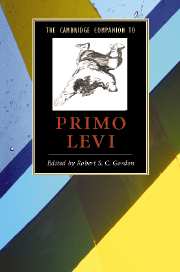2 - Primo Levi’s Jewish identity
from Part I: - Cultures
Published online by Cambridge University Press: 28 November 2007
Summary
Primo Levi's personal position on being a Jew has been enigmatic, both for himself and for his readers and critics. He himself made differing statements on his Jewish identity: in an interview with Giuseppe Grieco, he makes it clear that he had a religious upbringing and that he has a Jewish identity that he has 'no intention of discarding' (Voice of Memory, p. 275); but elsewhere he relegates Jewish identity to a very small element of his overall identity and plays down the strength of his religious education (e.g. The Periodic Table (Il sistema periodico, 1975), pp. 35-6; OI, 770).
The origins of some aspects of the complexity in Levi's relation to his Judaism are to be found in his embracing of so-called 'secular' or 'cultural' Judaism, most commonly defined as a bond with Jewish tradition and culture that creates a Jewish identity for which religious observation is a matter of choice rather than of spiritual conviction. He is often described and perceived as an assimilated Jew, because his immediate family was not Orthodox, and because he declared often that he had little spiritual conviction; but this alone does not capture the complexity of his and his family's rapport with their Judaism and their similarities to the Jewish community around them. In fact, in the strength of their identification with Jewish culture and in their relatively regular observance of religious ritual and calendars, Levi's family was typical of many Italian Jewish families at the time. They were perhaps closer to what contemporary British or American Jews would call, respectively, Reform or Conservative Judaism. Levi had a Bar Mitzvah at the typical age of thirteen, involving two years of religious preparation for the event, which at first he took seriously and with some fervour. At the time, he even vowed to wear tefillin, or phylacteries, but he was partly inspired, he later said, by the promise of a reward for his piety from his family, in the form of a new bicycle.
- Type
- Chapter
- Information
- The Cambridge Companion to Primo Levi , pp. 17 - 32Publisher: Cambridge University PressPrint publication year: 2007
- 3
- Cited by

